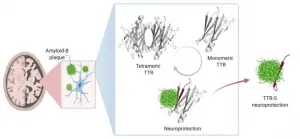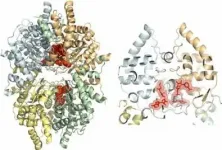How to mitigate the impact of a lockdown on mental health
2021-01-07
(Press-News.org) The Covid-19 pandemic is impacting people's mental health. But what helps and hinders people in getting through a lockdown? A new study led by researchers at the University of Basel addressed this question using data from 78 countries across the world. The results hint at the pivots and hinges on which the individual's psyche rests in the pandemic.
At the outset of the Covid-19 pandemic, little was known about the impact of population-wide governmental lockdowns. What was known was taken from restricted quarantines of small groups of people. "On the one hand, such drastic changes to daily routines can be detrimental to mental health," explains Professor Andrew Gloster from the University of Basel, co-leader of the study now published in PLOS One. "On the other hand, because the entire population was more or less equally affected during the lockdown, it remained unclear whether this impact would occur."
To address this question, Gloster and his international colleagues conducted an online survey in 18 languages. Almost 10,000 people from 78 countries participated, giving information about their mental health and overall situation during the Covid-19 lockdown.
One in ten respondents reported low levels of mental health - including negative affect, stress, depressive behaviors and a pessimistic view of society. Another 50% had only moderate mental health, which has previously been found to be a risk factor for further complications. These figures are consistent with other studies addressing the impact of the pandemic on mental health.
Lowest levels of well-being in Hong Kong and Italy
Overall, the responses in the different surveyed countries were largely similar. However, although no country emerged as either consistently better or worse across all outcomes, there were some differences. Hong Kong and Turkey reported more stress than other countries; the USA reported more depressive symptoms; and well-being was lowest in Hong Kong and Italy. Participants in Austria, Germany and Switzerland, on the other hand, reported significantly fewer negative emotions (negative affect) than the average level across all countries.
These differences are likely due to a combination of chance, nation-specific responses to the pandemic, cultural differences and factors such as political unrest. Beyond that, they may in part be explained by factors the researchers found to be connected to outcomes. Loss of financial income compared to pre-lockdown levels and not having access to basic supplies were consistently associated with worse outcomes. Factors that consistently improved outcomes were having social support, higher education levels, and being able to respond and adapt flexibly to the situation.
"Public health initiatives should target people without social support and those whose finances worsen as a result of the lockdown. Based on these results, interventions that promote psychological flexibility like acceptance and commitment therapy hold promise when it comes to mitigating the impact of the pandemic and lockdowns," says Gloster. Given the continued fluid development of the pandemic and its economic consequences, attention to people's mental health remains important.
INFORMATION:
ELSE PRESS RELEASES FROM THIS DATE:
2021-01-07
People view the wolf as either a threatening predator or a sign of a healthy natural habitat. Many proponents of nature and animal conservation welcome the spread of wolf populations in Germany. By contrast, farmers who graze herds directly impacted by the wolves' return are more critical. The team of Nicolas Schoof, Prof. Dr. Albert Reif of the Chair of Site Classification and Vegetation Science at the University of Freiburg, and Prof. Dr. Eckhard Jedicke of the Competence Center Cultural Landscape and the Department of Landscape Planning and Nature Conservation of Hochschule Geisenheim University has assessed the existing legal situation. On the basis of a range of environmental data they have determined the conflicts and drawn up possible solutions. In an article in ...
2021-01-07
Northeastern Asia has a complex history of migrations and plague outbursts. That is the essence of an international archaeogenetic study published in Science Advances and lead from the Department of Archaeology and Classical Studies at Stockholm University. Genomic data from archaeological remains from 40 individuals excavated in northeastern Asia were explored in the study.
"It is striking that we find everything here, continuity as well as recurrent migrations and also disease-related bacteria", says Anders Götherström, professor at the Center for Palaeogenetics at Stockholm University and one of the Principal investigators of the study.
The ...
2021-01-07
Sleep is ubiquitous in animals and humans and vital for healthy functioning. Thus, sleep after training improves performance on various tasks in comparison to equal periods of active wakefulness. However, it has been unclear so far whether this is due to an active refinement of neural connections or merely due to the absence of novel input during sleep. Now researchers at the Medical Center - University of Freiburg have succeeded in showing that sleep is more than rest for improving performance. The findings, which were published in the journal SLEEP on January 6, 2021, provide important information for planning periods of intensive ...
2021-01-07
January 7, 2021 (BRAMPTON - HAMILTON) -- When dealing with a life-limiting illness, palliative care can improve the quality of life for patients and families. However, for many people, the fear of "end of life" care prevents them from exploring it. A recent study from William Osler Health System (Osler) and McMaster University examined awareness of palliative care in the South Asian community and found that culture plays a critical role in the perception of palliative care. This perception, in turn, affects whether or not patients will be open to receiving it.
Funded by a McMaster University, Department ...
2021-01-07
TORONTO, January 7, 2021- What feels like up may actually be some other direction depending on how our brains process our orientation, according to psychology researchers at York University's Faculty of Health.
In a new study published in PLoS One, researchers at York University's Centre for Vision Research found that an individual's interpretation of the direction of gravity can be altered by how their brain responds to visual information. Laurence Harris, a professor in the Department of Psychology in the Faculty of Health and Meaghan McManus, a graduate student in his lab, found, using virtual reality, that people differ ...
2021-01-07
DALLAS - Jan. 7, 2020 - A protein that wreaks havoc in the nerves and heart when it clumps together can prevent the formation of toxic protein clumps associated with Alzheimer's disease, a new study led by a UT Southwestern researcher shows. The findings, published recently in the Journal of Biological Chemistry, could lead to new treatments for this brain-ravaging condition, which currently has no truly effective therapies and no cure.
Researchers have long known that sticky plaques of a protein known as amyloid beta are a hallmark of Alzheimer's and are toxic to brain cells. As early as the mid-1990s, other proteins were discovered in these plaques as well.
One of these, a protein known as transthyretin (TTR), ...
2021-01-07
Brazilian researchers have managed to decipher the structure of a protein found in parasites that cause neglected tropical diseases, paving the way to the development of novel medications. Thanks to the discovery it will be possible to seek more potent molecules capable of destroying the pathogens directly, with fewer adverse side-effects for patients.
The study detailed the structural characteristics of the protein deoxyhypusine synthase (DHS), found in Brugia malayi, one of the mosquito-borne parasites that cause elephantiasis, and in Leishmania major, the protozoan that causes cutaneous leishmaniasis.
Elephantiasis, also known as lymphatic filariasis, is an infection of the lymph system that can lead to swelling of the legs, arms, and genitalia. It may also harden and ...
2021-01-07
HOUSTON - (Jan. 7, 2021) - Proteogenomic analysis may offer new insight into matching cancer patients with an effective therapy for their particular cancer. A new study identifies three molecular subtypes in head and neck squamous cell carcinoma (HNSCC) that could be used to better determine appropriate treatment. The research led by Baylor College of Medicine, Johns Hopkins University and the National Cancer Institute's Clinical Proteomic Tumor Analysis Consortium (CPTAC) is published in the journal Cancer Cell.
Researchers profiled proteins, phosphosites and signaling ...
2021-01-07
TROY, N.Y. -- In a money-saving revelation for organizations inclined to invest in specialized information technology to support the process of idea generation, new research suggests that even non-specialized, everyday organizational IT can encourage employees' creativity.
Recently published in the journal Information and Organization, these findings from Dorit Nevo, an associate professor in the Lally School of Management at Rensselaer Polytechnic Institute, show standard IT can be used for innovation. Furthermore, this is much more likely to happen when the technology is in the hands of employees who are motivated to master technology, understand their role in the organization, ...
2021-01-07
In a study to examine a Mediterranean diet in relation to prostate cancer progression in men on active surveillance, researchers from The University of Texas MD Anderson Cancer Center found that men with localized prostate cancer who reported a baseline dietary pattern that more closely follows the key principles of a Mediterranean-style diet fared better over the course of their disease.
"Men with prostate cancer are motivated to find a way to impact the advancement of their disease and improve their quality of life," said Justin Gregg, M.D., assistant professor of Urology and lead author of the study, published today in Cancer. ...
LAST 30 PRESS RELEASES:
[Press-News.org] How to mitigate the impact of a lockdown on mental health

